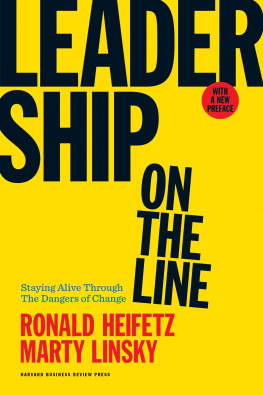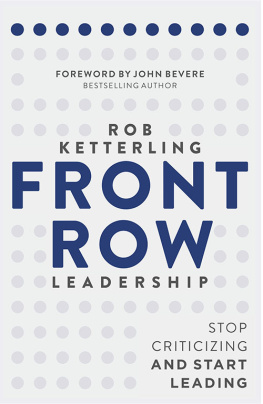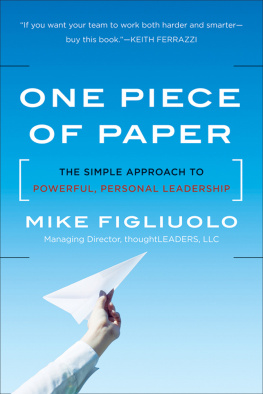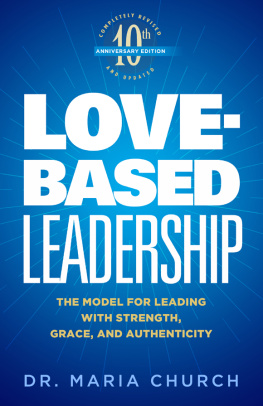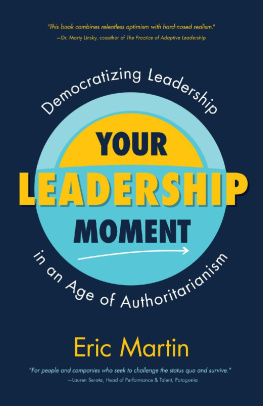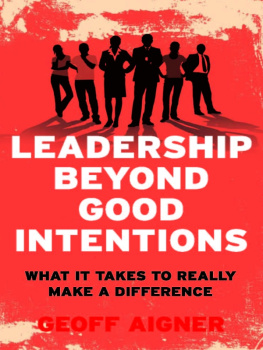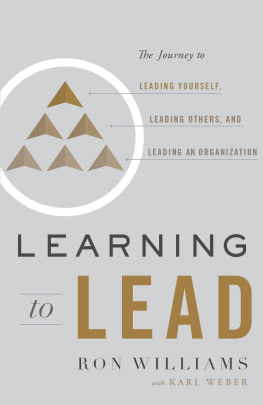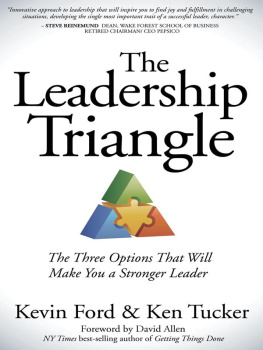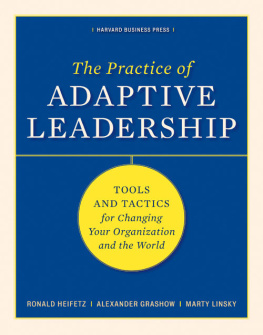
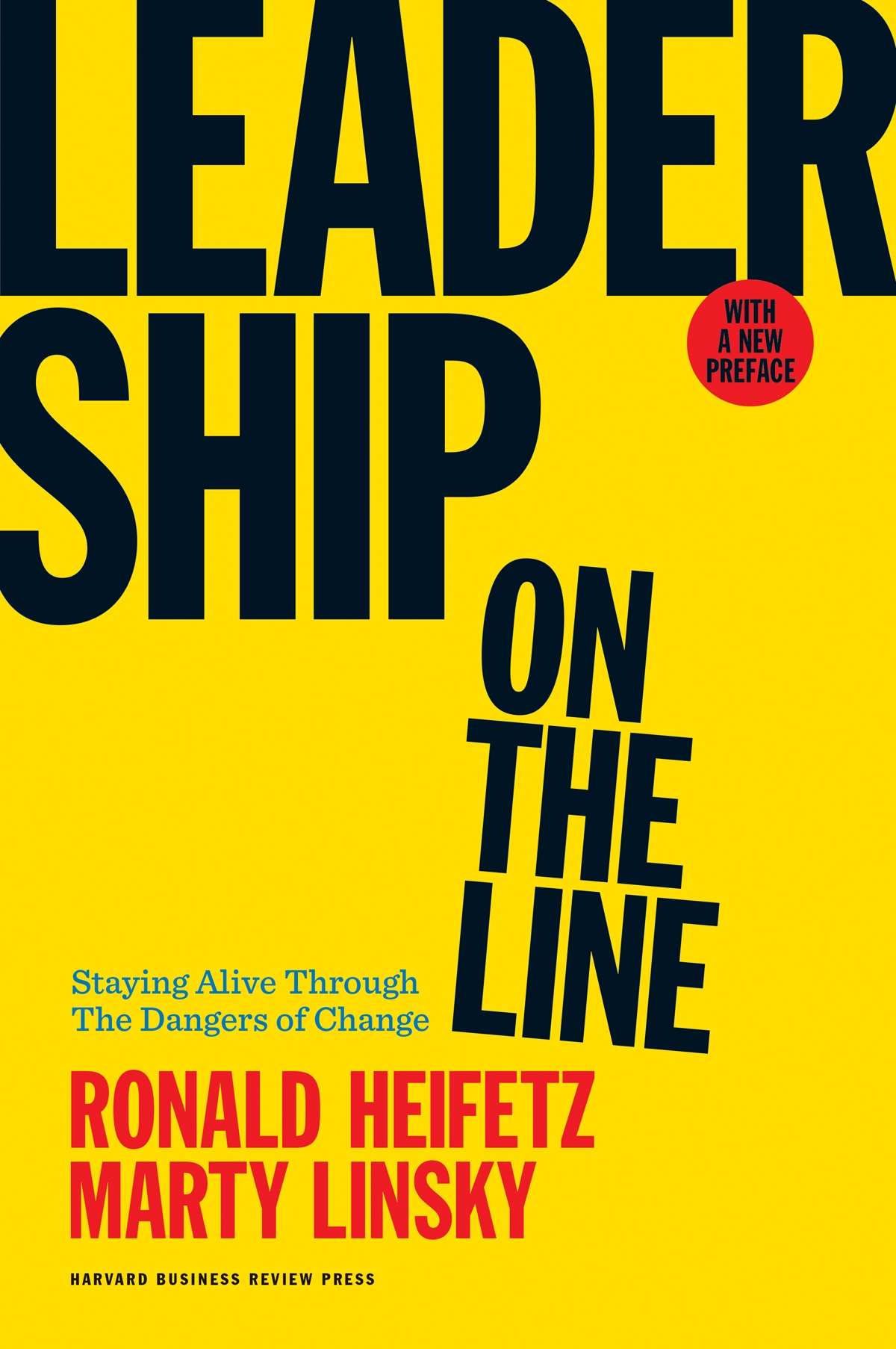
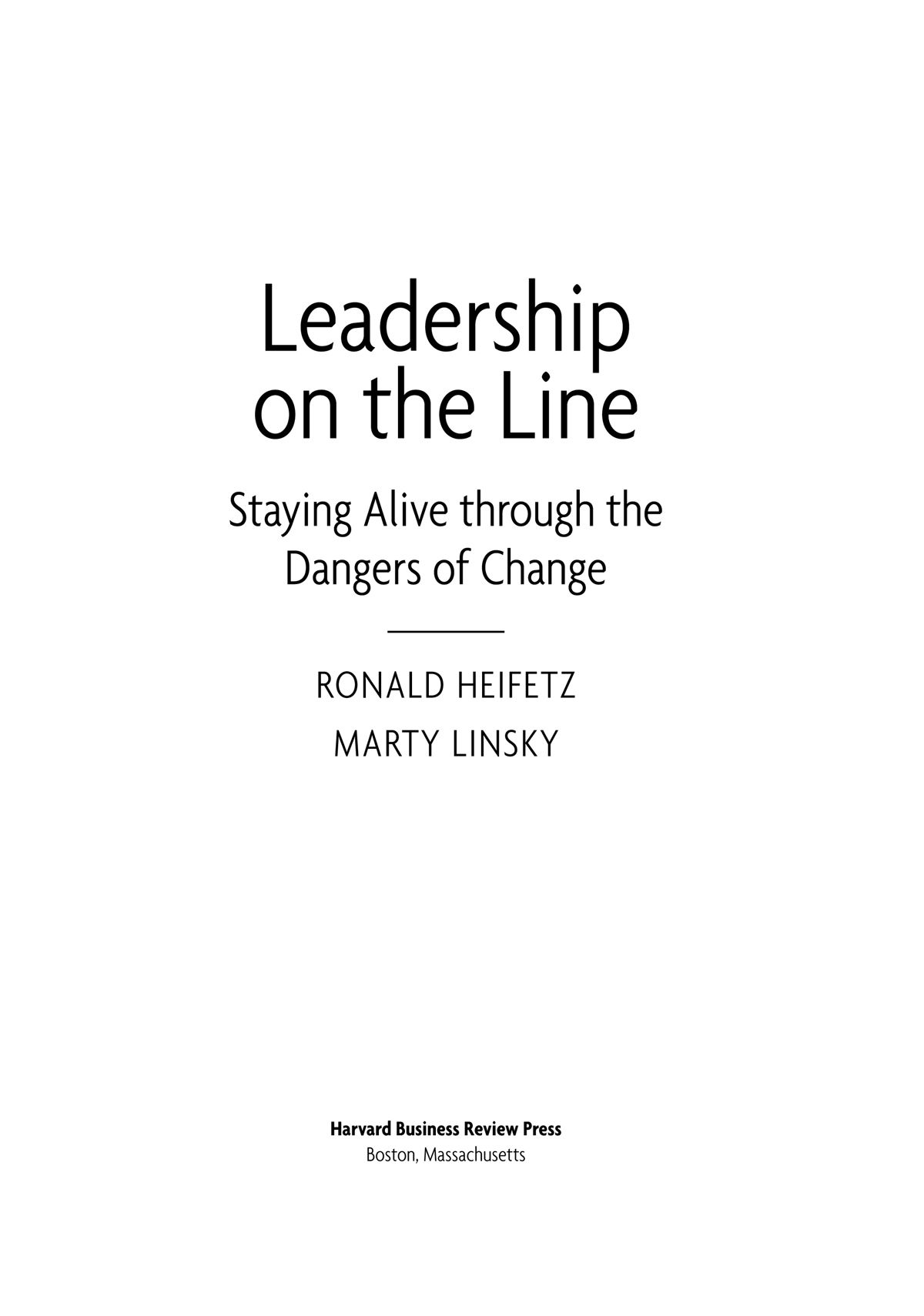
HBR Press Quantity Sales Discounts
Harvard Business Review Press titles are available at significant quantity discounts when purchased in bulk for client gifts, sales promotions, and premiums. Special editions, including books with corporate logos, customized covers, and letters from the company or CEO printed in the front matter, as well as excerpts of existing books, can also be created in large quantities for special needs.
For details and discount information for both print and ebook formats, contact .
Copyright 2017 Ronald Heifetz and Marty Linsky
All rights reserved
No part of this publication may be reproduced, stored in or introduced into a retrieval system, or transmitted, in any form or by any means (electronic, mechanical, photocopying, recording, or otherwise), without the prior permission of the publisher. Requests for permission should be directed to or mailed to Permissions, Harvard Business School Publishing, 60 Harvard Way, Boston, Massachusetts 02163.
First eBook Edition: July 2017
ISBN: 978-1-63369-283-1
eISBN: 978-1-63369-284-8
To David and Ariana (Anni), and Alison, Sam,
Max, Rich, Meredith, LeAnna, Guy, and Wit,
with faith that you will step out there
with heart and make a difference to people
Contents
Adaptability has been an essential ingredient for surviving and thriving for every species of life, from lifes beginning on earth.
This has surely been true for human systems trying to meet difficult challenges and flourish in the face of uncertainty and change, for whatever forms that system takes: global networks, a nation, a tribe, a town, a company, a family, or a person.
So if your community, at whatever scale you define it, needs to focus on enhancing one skill set, one capacity, one competency to help ensure going forward successfully, choose adaptability. And, what holds for any human system we think holds for you as an individual as well.
Now More Than Ever
We wrote this book with three goals in mind: (1) to show that productive change must be adaptive to be sustainable; (2) to offer tools and frameworks that lower risk so people can see how to lead and stay alive through the dangers of change; and (3) to encourage people to seize opportunities to exercise leadership that are within reach every day.
While the need for adaptability has always been critical, never has its significance been as front and center as it is today. People everywhere are having to figure out how to adapt to the multiple daunting challenges facing the world: stateless and state-sponsored terrorism, wars, and refugees; the effects of climate change in the violence of storms, flooding of coastal cities, and drought; the dangers of new viral pandemics; population growth that exceeds the carrying capacity of families and economies. The internet and its social media offspring have changed how human beings communicate with each other, how war is fought, and how politics are played. The Great Recession that began in 2008 not only threw the worldwide equity markets into free fall, but led to a recovery that fell unevenly, widening further the income gap.
Politically, the United States elected its first African American president, yet polarizing movements emerged in the world, on both the left and the right, often entering and upending mainstream electoral processes. Elections in democratic settings in Asia, Australia, Europe, South America, and the United States have been won, or nearly won, by politicians with authoritarian inclinations and an appeal promising easy answers and a restoration of order, predictability, and calm. The key word in President Trumps 2016 campaign mantra, Make America Great Again, was Again. The desire for restoration, to take ones country back, whether you share that yearning or not, is a pushback against the difficulties and hardship of adapting to new, unfamiliar, often threatening realities.
The constancy, complexity, and depth of the change challenge all of us. On one hand, we face extraordinary new opportunities to thrive individually and collectively. On the other hand, with deep change comes loss, people left behind, long-held values questioned, beloved norms and practices undone, and the security of jobs, familiarity, and predictability gone, simply and suddenly gone.
All of this volatility has surfaced festering challenges in the world order and in the differential experiences of those people who were riding the waves versus those who felt they were drowning in them.
Take population growth. A worldwide consensus on the importance of population policy has unraveled, for reasons that we believe are only partly justifiable, with major impact on poverty, terrorism, sex trafficking, pandemics, mass migrations, and of course, climate change. In many countries around the world, families, school systems, and local economies are overwhelmed by the number of children, rendering young men vulnerable to terrorist and criminal recruiters, and young women to sex predators and traffickers. Climate change seems intractable not only because, as consumers, many people are wedded to old jobs and old patterns of fuel and meat consumption, but also because, as aspirants, particularly in the digital age, huge populations of young poor people worldwide will seek to consume more. No longer will people find happiness in subsistence and isolation. Pandemics, too, are fed by the high density of people living close together. These factors have combined to strain the holding environments of all of our communities and societies, including those in the West, creating the trigger points of drought and floods from home, and migrations, epidemics, and terrorism from abroad. In Syria, for example, a high rural growth rate combined with a long drought prior to 2011 led to a massive movement of farming communities to the cities, and created a ripe context for civil war, brutal repression, the growth of regressive Islamic movements, terrorism, and mass migration.
In leadership terms, these conditions too often generate yearning for authoritative direction, protection, and the return of order. Just as dictatorships in history usually emerge in crisis, the conditions of our times create a political marketplace for certainty and answers. Distressed citizens reward pandering, and politicians oblige. Politicians overpromise to win election and earn distrust because they cannot deliver. Inevitably, amid the adaptive challenges of these decades, people feel that those in authority are letting them down, not meeting their expectations, not hearing their pain, talking at them rather than listening to them. Feeling betrayed and increasingly insecure, many people angrily retreat into narrower identity groups. The strain on solidarity in diversity is palpable around the world.
We need to break this vicious cycle. Citizens need to face the complexity and consequences of their demands, but politicians need to engage citizens more honestly and artfully to lead that process. Its not enough for officeholders to work hard to comprehend the issues if they then shield their constituents from tough choices. Profound change is more honest than grandiose, more incremental than the experience of it, and builds from the enduring values of individual human beings and the orienting values of human communities. We believe its possible to lead and stay alive, to both win reelection and engage people to own their part of change in an iterative, adaptive process of renewal.

